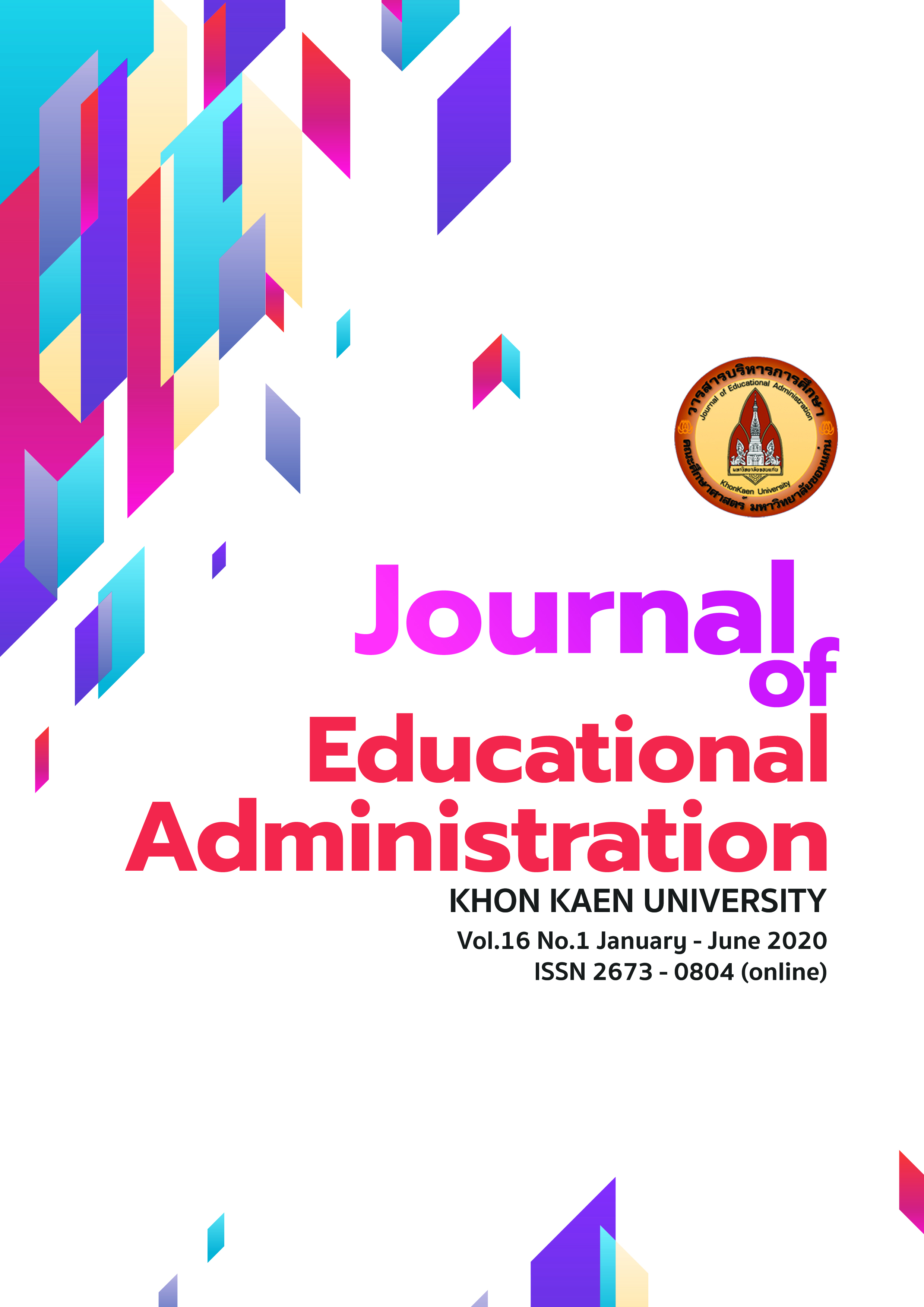แนวทางการสร้างความเป็นพลเมืองดิจิทัลของนักเรียนระดับมัธยมศึกษา GUIDELINE FOR A ENHANCING DIGITAL CITIZENSHIP OF STUDENTS IN SECONDARY SCHOOL
Main Article Content
บทคัดย่อ
การวิจัยครั้งนี้เป็นการวิจัยเชิงบรรยาย มีวัตถุประสงค์เพื่อศึกษาแนวทางการสร้างความเป็นพลเมืองดิจิทัลของนักเรียนระดับมัธยมศึกษา การดำเนินการวิจัยแบ่งเป็น 2 ระยะ คือ ระยะที่ 1 เป็นการศึกษาเอกสาร วิเคราะห์และสังเคราะห์แนวคิด ทฤษฎีและงานวิจัยที่เกี่ยวข้อง จากนั้นทำการสัมภาษณ์เชิงลึกผู้ทรงคุณวุฒิ จำนวน 5 คน และระที่ 2 การตรวจสอบแนวทางการสร้างความเป็นพลเมืองดิจิทัลของนักเรียนระดับมัธยมศึกษาโดยผู้ทรงคุณวุฒิ จำนวน 3 คน เครื่องมือที่ใช้ ได้แก่ แบบสัมภาษณ์กึ่งโครงสร้าง และทำการวิเคราะห์ข้อมูลโดยใช้วิธีการวิเคราะห์เนื้อหาแล้วนำเสนอเป็นความเรียง
ผลการวิจัยพบว่า องค์ประกอบคุณลักษณะพลเมืองดิจิทัล มี 3 ด้าน คือ 1) การรู้และใช้ดิจิทัล 2) จริยธรรมในการใช้ดิจิทัล 3) ความสัมพันธ์และสังคมดิจิทัล ซึ่งแนวทางการสร้างพลเมืองดิจิทัลของนักเรียนระดับมัธยมศึกษาจะต้องได้รับความร่วมมือจากผู้บริหาร ครู และนักเรียน ผลการประเมินแนวทางการสร้างความเป็นพลเมืองดิจิทัลของนักเรียนระดับมัธยมศึกษามีความเหมาะสมและความเป็นประโยชน์อยู่ในระดับมากที่สุด ส่วนความเป็นไปได้อยู่ในระดับมาก
Article Details
เอกสารอ้างอิง
กระทรวงดิจิทัลเพื่อเศรษฐกิจและสังคม. (2562). แผนพัฒนาดิจิทัลเพื่อเศรษฐกิจและสังคม. ค้นเมื่อ 25 มีนาคม
, จาก https://www.etda.or.th/content_files/2/files/05_Thailand_Digital_Plan.pdf
กระทรวงศึกษาธิการ. (2560). แผนการศึกษาแห่งชาติ ฉบับที่ 12 (พ.ศ. 2560 - 2574). กรุงเทพฯ: บริษัท
พริกหวานกราฟฟิค จำกัด.
สำนักงานกองทุนสนับสนุนและสร้างเสริมสุขภาพ. (2562). พลเมืองดิจิทัล. ค้นเมื่อ 25 มีนาคม2563, จาก
https://www.thaihealth.or.th/Content/48161-(Digital%20Citizenship).html
ต้องตา จำเริญใจ. (2561). ความเป็นพลเมืองดิจิทัลของนักเรียนชั้นประถมศึกษาปีที่ 1- 6 ของโรงเรียนในสังกัดสำนักงานเขตพื้นที่การ
ศึกษาประถมศึกษาเพชรบูรณ์ เขต 3. วิทยานิพนธ์ปริญญาศึกษาศาสตรมหาบัณฑิต สาขาการบริหารการศึกษา มหาวิทยาลัย
เทคโนโลยีราชมงคล ธัญบุรี
พรชนิตว์ ลีนาราช (2560).ทักษะการรู้ดิจิทัลเพื่อพัฒนาคุณภาพการเรียนรู้.วารสารห้องสมุด. (61) 2 กรกฎาคม – ธันวาคม,76-92.
พิจิตรา เพชรเภรี.(2562). พลเมืองดิจิทัล (Digital Citizenship) . ค้นเมื่อ 25 มีนาคม 2563, จาก
https://www.thaihealth.or.th/Content/48161-%E9 (Digital%20Citizenship).html
ไพลินรัตน์ กุณสิทธิ์.(2560).ความต้องการจำเป็นในการเสริมสร้างความเป็นพลเมืองดิจิทัลของนักเรียน
โรงเรียนมัธยมวัดนายโรง. Online Journal of Education, 12(4), 205-219. Retrieved from
https://so01.tci-thaijo.org/index.php/OJED/article/view/140871
ราชกิจจานุเบกษา. (2560). พระราชบัญญัติการพัฒนาดิจิทัลเพื่อเศรษฐกิจและสังคม พ.ศ. 2560. เล่มที่
ตอนที่ 10 ก, 24 มกราคม 2560, หน้า 1-23
วรพจน์ วงศ์กิจรุ่งเรือง .(2561).ทักษะดิจิทัลก้าวสู่พลเมืองในศตวรรษที่ 21. ค้นเมื่อ 25 มีนาคม 2563, จาก
https://ops.go.th/main/index.php/aboutus/history/1355-goto-citizens21st.html
วรรณากร พรประเสริฐ.(2562). ความเป็นพลเมืองดิจิทัลของนักศึกษาระดับปริญญาตรีในสถาบันอุดมศึกษา
ของรัฐ.วารสารศึกษาศาสตร์ มหาวิทยาลัยทักษิณ.(19) 2.กรกฎาคม – ธันวาคม,104-117.
เศกสรร สกนธวัฒน์. กลยุทธ์การบริหารโรงเรียนในเครือมูลนิธิคณะเซนคาเบียลแห่งประเทศไทยตาม
แนวคิดการเสริมสร้างนักเรียนให้มีความเป็นพลเมืองดิจิทัล.วิทยานิพนธ์ปริญญาครุศาสตรดุษฎี
บัณฑิต สาขาการบริหารการศึกษา จุฬาลงกรณมหาวิทยาลัย.
Australian Curriculum. (2014). Digital Technologies. Retrieved March 25, 2020, from
https://www.australiancurriculum.edu.au/f-10-curriculum/technologies/digital-technologies/
Berardi, Ryan P. (2015). Digital Citizenship: Elementary Educator Perceptions and
Formation of Instructional Value and Efficacy. Doctor of Education, Immaculata University.
Castells, M. (2000). Materials for an exploratory theory of the network society. Retrieved March 25,
, from https://onlinelibrary.wiley.com/doi/epdf/10.1111/j.1468-4446.2000.00005.x
Gazi, Z. A. (2016). Internalization of Digital Citizenship for the Future of All Levels of Education. Education
and Science Journal, 41(186), 137-148.
International Society for Teachnology in Education (ISTE). (2016). Digital Citizenship. Retrieved March 25,
, from https://www.iste.org/learn/digital-citizenship
Netsefe New Zeland. (2014). Digital Citizenship in Newzealand School; Overview. Retrieved March 25,
, from https://www.netsafe.org.nz/wpcontent/uploads/2015/09/Digital_Citizenship_in_
New_Zealand_Schools_Overview.pdf
Ribble, M. (2011). Digital Citizenship in School. (2nd Ed). Eugene, Oregon: The International
Society for Technology in Education.
UNESCO. (2013). Bangkok Asia and Pacific Regional Bureau for Education. Fostering Digital Citizenship
through Safe and Respondsible Use of ICT. p 20-23.


